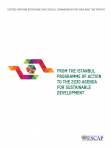Least developed countries (LDCs) could make significant progress on the Sustainable Development Goals (SDGs) by pursuing action under the Istanbul Programme of Action (IPoA), finds a report by the UN Economic and Social Commission for Asia and the Pacific (ESCAP).
ESCAP launched the report during the Midterm Review of the IPoA, which convened in Antalya, Turkey, from 27-29 May 2016.
 27 May 2016: Least developed countries (LDCs) could make significant progress on the Sustainable Development Goals (SDGs) by pursuing action under the Istanbul Programme of Action (IPoA), finds a report by the UN Economic and Social Commission for Asia and the Pacific (ESCAP). ESCAP launched the report during the Midterm Review of the IPoA, which convened in Antalya, Turkey, from 27-29 May 2016.
27 May 2016: Least developed countries (LDCs) could make significant progress on the Sustainable Development Goals (SDGs) by pursuing action under the Istanbul Programme of Action (IPoA), finds a report by the UN Economic and Social Commission for Asia and the Pacific (ESCAP). ESCAP launched the report during the Midterm Review of the IPoA, which convened in Antalya, Turkey, from 27-29 May 2016.
The IPoA aims to support LDCs’ sustainable development, help LDCs build their human and productive capacities and support their graduation from LDC status. According to ESCAP, Asia-Pacific LDCs continue to face structural challenges in achieving their development goals, many of which relate to their initial endowments and geographic features, such as their remoteness, costly access to international markets and vulnerability to disasters.
The report, titled ‘From the Istanbul Programme of Action to the 2030 Agenda for Sustainable Development,’ identifies significant complementarities between IPoA and the 2030 Agenda for Sustainable Development. It notes that the last five years of the IPoA and the first five years of the 2030 Agenda will be implemented simultaneously and identifies overlaps between IPoA actions and SDG targets.
The report proposes an analytical framework to identify pathways for achieving the SDGs in each country based on their individual capacities and development progress. Using Bangladesh as an example, the report illustrates the importance of identifying initial priorities (education, reduction of inequalities and infrastructure) and sequencing actions, underscoring the importance of planning and prioritization for making progress and ensuring necessary policy coherence. The report further recommends identifying bottlenecks and trade-offs, saying “bottlenecks represent areas that require the most attention” and are areas where additional financial resources and development partner support could be most effectively allocated.
Participants discussed the report during a side event at the Midterm Review of the IPoA. The event brought together high-level officials from around the world to reaffirm commitments to address LDCs’ special needs and identify ways to support them in implementing the 2030 Agenda.
There are 12 LDCs in the Asia-Pacific region: Afghanistan; Bangladesh; Bhutan; Cambodia; Kiribati; the Lao People’s Democratic Republic (Lao PDR); Myanmar; Nepal; Solomon Islands; Timor-Leste; Tuvalu; and Vanuatu. [ESCAP Press Release] [Publication Website] [Publication: From the Istanbul Programme of Action to the 2030 Agenda for Sustainable Development] [IISD RS Story on Midterm Review]